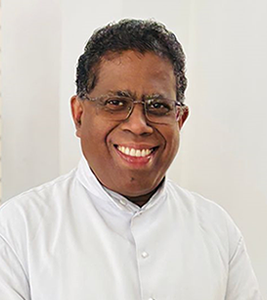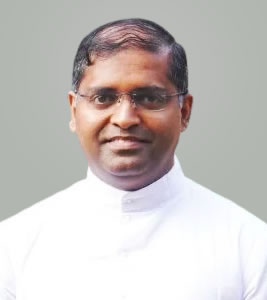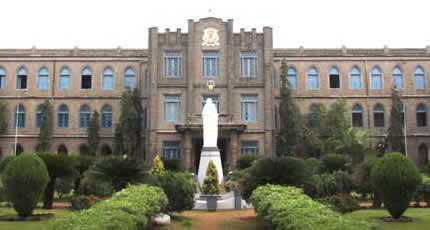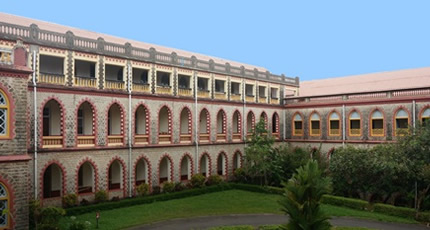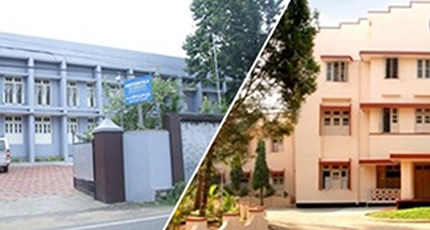The First Cycle of the Theology Course is an initiation to give the student a synthetic view of the Christian mysteries and of the main fundamental theological disciplines.
Degree Of Baccalaureate In Theology
1. Eligibility
For admission to the First Cycle of Theology course leading to the Degree of Baccalaureate in Theology (B.Th.), a candidate should have B.Ph. Degree or Diploma in Philosophy. The applicant should be presented by the Rector or the Superior of the student. Lay
2. Duration and Content
The course leading to the Degree of Baccalaureate in Theology extends over three years and each year is divided into two semesters. For the B. Th. Programme a student is expected to attend courses of 180 credits. A credit, by which the course-work is measured, consists of 25 study-hours. Study-hours are split into lecture hours and nonlecture hours (i.e. self-study, assignments and practical hours).
3. B.Th. Thesis
As part of the Degree Course, students have to prepare a Scientific research paper on a theological subject under the guidance of a professor of the faculty. The text must have ca.15,000 words excluding the face-sheets, footnotes or endnotes. Two printed copies as well as a soft copy of the same must be submitted to the Faculty Office on or before 10th December of the third year which will be scrutinized by the dean.
4. Evaluation of Courses
All courses will be evaluated by means of examinations with marks. Examinations may be oral or written. The evaluation of the one-credit courses is permitted with Assignments/Projects.
Maximum 25% of the total marks could be given for internal assessment. The pass mark is 50% in each individual subject.
At the end of sixth semester there will be comprehensive oral and written examinations in the subjects of Biblical Theology, Moral Theology and Systematic Theology for about an hour (20 minutes each for a panel). 50% marks are necessary for a pass in each panel of the comprehensive examinations.
All the examinations will be arranged and announced by the Controller/Asso. Controller of Examinations. The dates of all examinations are given in the Handbook and Calendar. For the reexamination a Fee of Rs.50.00 will be charged per subject.
5. Grading System
The grading of result done according to the percentage of the marks obtained in the examinations and the Thesis as follows:
- 90-100 % High Distinction (Summa cum laude)
- 80-89 % Distinction (Magna cum laude)
- 70-79 % First Class (cum Laude)
- 60-69 % Second Class (Bene Probatus)
- 50-59% Third Class (Probatus)
6. Programme of Study
The programme of study comprises Lecture Courses, Seminars and Thesis. The Courses are divided into the following branches of Theology: Biblical Theology, Fundamental and Systematic/Dogmatic Theology, Moral Theology, Patrology, Church History, Liturgy, Spiritual Theology, Pastoral Theology and Canon Law. The subjects are divided into the following categories: Principal Obligatory Subjects, Auxiliary Obligatory Subjects, Optional Subjects, and Other Basic Requirements.
Principal Obligatory Subjects
BIBLICAL THEOLOGY (BT) [40 Credits]
CODE – BT | 01 Introduction to Bible and Biblical Hermeneutics | CREDITS – 3
CODE – BT | 02 Pentateuch | CREDITS – 3
CODE – BT | 03 Historical Books | CREDITS – 2
CODE – BT | 04 Prophets – I | CREDITS – 3
CODE – BT | 05 Prophets – II | CREDITS – 3
CODE – BT | 06 Psalms | CREDITS – 2
CODE – BT | 07 Wisdom Writings | CREDITS – 3
CODE – BT | 08 Gospel of Mark and Synoptic Problem | CREDITS – 3
CODE – BT | 09 Gospel of Matthew | CREDITS – 2
CODE – BT | 10 Johannine Writings | CREDITS – 3
CODE – BT | 11 Gospel of Luke and Acts of the Apostles | CREDITS – 3
CODE – BT | 12 St Paul – I | CREDITS – 3
CODE – BT | 13 St Paul – II | CREDITS – 3
CODE – BT | 14 Captivity Letters | CREDITS – 2
CODE – BT | 15 Letter to the Hebrews | CREDITS – 1
CODE – BT | 16 Book of Revelation | CREDITS – 1
FUNDAMENTAL AND SYSTEMATIC THEOLOGY (43 CREDITS)
CODE – ST 01 | Introduction to Theology | CREDITS – 2
CODE – ST 02 | Theology of Revelation and Faith | CREDITS – 3
CODE – ST 03 | Christology | CREDITS – 3
CODE – ST 04 | God of Salvation and Holy Trinity | CREDITS – 3
CODE – ST 05 | Sacraments in General | CREDITS – 3
CODE – ST 06 | Sacraments in Particular | CREDITS – 2
CODE – ST 07 | Sacrament of Reconciliation | CREDITS – 3
CODE – ST 08 | Theology of the Eucharist | CREDITS – 3
CODE – ST 09 | Grace and Pneumatology | CREDITS – 3
CODE – ST 10 | Ecclesiology | CREDITS – 3
CODE – ST 11 | Theological Anthropology | CREDITS – 3
CODE – ST 12 | Theology of Religions and Dialogue | CREDITS – 2
CODE – ST 13 | History of Religions & Atheismv | CREDITS – 2
CODE – ST 14 | | Eschatology | CREDITS – 2
CODE – ST 15 | Missiology | CREDITS – 2
CODE – ST 16 | | Mariology | CREDITS – 1
CODE – ST 17 | Social Teachings of the Church | CREDITS – 2
CODE – ST 18 | Ecumenism | CREDITS – 1
MORAL THEOLOGY (12 CREDITS)
CODE – MT 01 | Fundamental Moral Theology | CREDITS – 3
CODE – MT 02 | Bio-Ethics | CREDITS – 3
CODE – MT 03 | Marriage and Sexuality | CREDITS – 3
CODE – MT 04 | Social Ethics | CREDITS – 3
LITURGY AND PASTORAL THEOLOGY (15 CREDITS)
CODE – LP 01 | Introduction to Liturgy | CREDITS – 2
CODE – LP 02 | Liturgical Year and Liturgy of Hours | CREDITS – 2
CODE – LP 03 | Liturgy of the Sacraments | CREDITS – 3
CODE – LP 04 | Liturgy of the Eucharist | CREDITS – 3
CODE – LP 05 | Pastoral Theology | CREDITS – 2
CODE – LP 06 | Catechetic & Homiletics | CREDITS – 3
CHURCH HISTORY AND PATROLOGY (13 CREDITS)
CODE – CH 01 | Ancient and Medieval Church History | CREDITS – 3
CODE – CH 02 | Modern and Contemporary Church History | CREDITS – 3
CODE – CH 03 | Indian Church History | CREDITS – 3
CODE – CH 04 | Patrology and Archaeology | CREDITS – 4
CANON LAW (15 CREDITS)
CODE – CL 01 Canon Law I: Introduction to Canon Law and General Norms | CREDITS – 3
CODE – CL 02 Canon Law II: Magisterium, Temporal Goods, Penal Sanctions | CREDITS – 3
CODE – CL 03 Canon Law III: Hierarchy | CREDITS – 3
CODE – CL 04 Canon Law IV: Religious and Sacraments | CREDITS – 3
CODE – CL 05 Canon Law V: Marriage | CREDITS – 3
SPIRITUAL THEOLOGY (6 CREDITS)
CODE – SP 01 | Priestly Spirituality & Celibacy | CREDITS – 3
CODE – SP 02 | Spiritual Theology | CREDITS – 3
AUXILIARY OBLIGATORY SUBJECTS (13 CREDITS)
CODE – AS 01 | Biblical Hebrew | CREDITS – 3
CODE – AS 02 | Biblical Greek | CREDITS – 3
CODE – AS 03 | Oriental Theology | CREDITS – 2
CODE – AS 04 | Indian Socio-Cultural Analysis and Contextualization | CREDITS – 2
CODE – AS 05 | Modern Trends in Theology | CREDITS – 2
CODE – AS 06 | Theological Methodology & Research Methodology | CREDITS – 1
OPTIONAL SUBJECTS (3 x 2 = 6)
CODE – OS 01 Introduction to the Summa Theologica of St Thomas Aquinas | CREDITS – 2
CODE – OS 02 Practical Theology | CREDITS – 2
CODE – OS 03 Theology of the Laity | CREDITS – 2
CODE – OS 04 Church as Communion of Churches: Inter-ritual matters in the context of Kerala Church | CREDITS – 2
CODE – OS 05 Recent Encyclicals, Apostolic Exhortations and Apostolic Letters | CREDITS – 2
CODE – OS 06 Dialogue with other Religions | CREDITS – 2
CODE – OS 07 Special Questions in Biblical Theology | CREDITS – 2
CODE – OS 08 Eco-Theological Rereading of theCreation Accounts | CREDITS – 2
CODE – OS 09 The Motif of Fear of God in Wisdom Literature | CREDITS – 2
CODE – OS 10 The Christian Missionary Speeches in the Acts of the Apostles | CREDITS – 2
CODE – OS 11 Special Questions in Moral Theology | CREDITS – 2
CODE – OS 12 Marriage Problems & Canonical Solutions | CREDITS – 2
CODE – OS 13 Theology of Leadership and Ministry | CREDITS – 2
CODE – OS 14 Media and Communication | CREDITS – 2
Other Topics of relevance may be added here as per the requirements
OTHER BASIC REQUIREMENTS (17 CREDITS)
CODE – OR 01 | Seminar for 1st Year B.Th. Students | CREDITS – 3
CODE – OR 02 | Seminar for 2nd Year B. Th. Students | CREDITS – 3
CODE – OR 03 | Memorial Lectures | CREDITS – 1
CODE – OR 04 | Scientific Research Paper, 3rd Year B. Th. Students | CREDITS – 2
CODE – OR 05 | Comprehensive Examination (Viva voce – 6 + Written – 2 | CREDITS – 8


